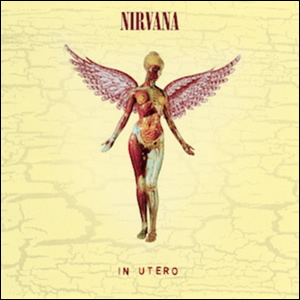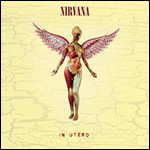In Utero by Nirvana
 Even though it was a phenomenal commercial success, all three members of Nirvana had expressed dissatisfaction with the polished production of their 1991 album, Nevermind. With this in mind, the production of In Utero was intentionally stripped down with little to no overdubs and recorded in two weeks flat. Produced by Steve Albini, the oft-abrasive sounding album was nearly rejected by the group’s label DGC and ultimately the band hired a secondary producer to make minor changes to the album’s two radio singles. Still, the album shot instantly to the top of the album charts upon its release and has since been certified five times platinum.
Even though it was a phenomenal commercial success, all three members of Nirvana had expressed dissatisfaction with the polished production of their 1991 album, Nevermind. With this in mind, the production of In Utero was intentionally stripped down with little to no overdubs and recorded in two weeks flat. Produced by Steve Albini, the oft-abrasive sounding album was nearly rejected by the group’s label DGC and ultimately the band hired a secondary producer to make minor changes to the album’s two radio singles. Still, the album shot instantly to the top of the album charts upon its release and has since been certified five times platinum.
The band had originally wanted to record during the summer of 1992, but domestic situations made that impossible. In October 1992, they recorded several instrumentals during a Seattle demo session with Jack Endino, who had produced the group’s 1989 debut album Bleach. In January 1993, the group recorded another set of demos while on tour in Brazil, one of became the “hidden” track “Gallons of Rubbing Alcohol Flow Through the Strip”. Using these groups of demos along with other material composed as early as 1990, Albini and the band members decided on a self-imposed two-week deadline for recording and paid for the sessions with their own money to limit label interference.
Albini felt the sound of Nevermind was “sort of a standard hack recording that has been turned into a very, very controlled, compressed radio-friendly mix. After the recording sessions were completed, Nirvana sent unmastered tapes of the album to several individuals, including the president of DGC’s parent company Geffen Records Ed Rosenblatt. When asked about the feedback he received, the group’s leader Kurt Cobain said “the grown-ups don’t like it.”
An almost “new wave” approach makes for a surprising start to the album with “Serve the Servants”. The song is strong, upbeat, and melodic (with the exception of what seems to be intentional de-tuning of some notes). “Scentless Apprentice” is the only track on the album not written solely by Cobain, as bassist Krist Novoselic and drummer Dave Grohl add their compositional skills. However, the production of this second song is a bit unfocused with an attempt at junk metal, which comes off as less-than-authentic with noisy guitars and muddled drum sounds.
“Heart-Shaped Box” is the first track on the album that sounds similar to the material on Nevermind. Although it never really leaves the same three chords, the song was melodic enough to be released as the album’s first single after some additional “treatment” mixing was done by engineer Scott Litt. The song reached number one on Billboard‘s Modern Rock Tracks chart and reached number five on the UK pop chart.
The controversial “Rape Me” had been performed live by the band since 1991. The song addresses Cobain’s distain of the media in light of their sudden success and is the first on the album to contain decent sounding bass by Novoselic. “Frances Farmer Will Have Her Revenge on Seattle” was inspired by the 1978 biography Shadowland, which Cobain had read in high school. Sonically, the song is all about dynamics but is not very well put together compositionally and the droning vocal screams tend to wear thin by this point in the album. The album hits a bit of a lull through the middle. “Dumb” is a very apt title and is uninspired with its subject of the struggles with complacency. “Very Ape” is fast and surprisingly crisp for this album’s production, punk influenced with some actual overdubbed guitars. “Milk It” contains some slightly interesting stop/start action musically, but this is counterbalanced with some frivolous lyrics.
“Pennyroyal Tea” starts as an almost REM-like song before breaking into a strong punk/metal section during the chorus with an (almost) standard guitar lead. The song was due to be released as the third single from the album but plans were halted after Cobain’s suicide in April 1994. “Radio Friendly Unit Shifter” is one of the most unique and rewarding songs on the album. Grohl’s steady drumming holds together this wild piece with flavored feedback effects and a cool anti-hero chorus hook. The experimental “Tourette’s” contains a heavy “noise machine” type sound with a three chord punk screed which ultimately does little more than set up the fine closer.
The finest track on the album is saved for last with “All Apologies”, a melodic, deep, and excellent closer. The song had been around since 1990 and Nirvana first recorded the song in Seattle on January 1, 1991. The In Utero track features Kera Schaley on cello, the only extra session player on the album. It was also remixed by Litt when Cobain asserted that the original vocals and bass sounded muddy. Lyrically, the song was inspired by Cobain’s wife and newborn daughter. The song received heavy airplay and was nominated for a Grammy Award in 1995. More importantly, the song was an excellent closer for the band’s final album.
Nirvana embarked on a world tour to promote the In Utero. On the European leg of the tour in March 1994, Cobain suffered a drug overdose in Rome and agreed to enter drug rehabilitation, but he soon went missing. On April 8, 1994 he was found dead in his Seattle home as the result of self-inflicted shotgun blast, ending his life at age 27, and sealing Nirvana in the tomb of rock history.
~
Part of Classic Rock Review’s celebration of 1993 albums.







Top 9 Album Closing Songs | River of Rock
August 22, 2017 @ 5:55 pm
[…] final track on Nirvana’s final album may be the finest track on In Utero. “All Apologies” is a melodic, deep, and excellent closer, with a guest cello player to […]
November 8, 2020 @ 5:45 pm
I did not know that the members of Nirvana did not like their 1991 album “Nevermind.” I thought that since the album was successful, they would’ve at least thought the album was O.K., but no, they really disliked it. Anyway, great blog! I’m reviewing the same album on my blog entitled “Ready to Rock … and Review!”